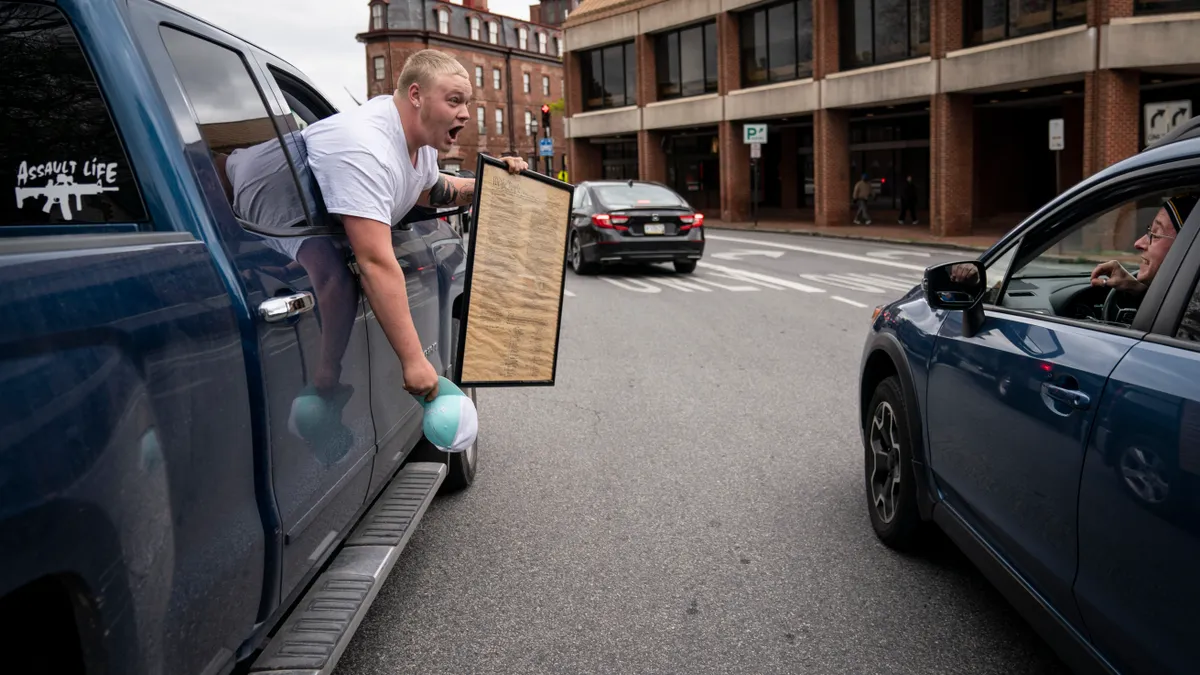Dive Brief:
- More than 80% of local government officials have experienced some form of harassment, abuse or violence, according to a report released last week by the National League of Cities (NLC). The findings are based on a survey of 112 local officials and nine interviews.
- Among the incidents that local officials reported were death threats, vandalized homes, intimidating phone calls and outrage in public meetings. The trend has only accelerated during the COVID-19 pandemic, the report found, and has been fueled by the spread of misinformation on social media.
- NLC cautions that the harassment is disproportionately targeting women, people of color and LGBTQ+ officials, which can impact representation in local government. "It’s an incredible challenge to continue to diversify our elected officials when this level of vitriol is targeted at them," said Brooks Rainwater, Director of NLC’s Center for City Solutions and a co-author of the report.
Dive Insight:
The need for public health restrictions during the pandemic — including mask mandates and vaccine requirements — have brought a fierce backlash from a vocal minority of mostly Republican-leaning U.S. residents. Media reports have chronicled angry school board and city council meetings. Thirteen men were even charged last year as part of a plot to kidnap Michigan Democratic Gov. Gretchen Whitmer, who at the time, was on the receiving end of fierce backlash from some surrounding her decision to impose pandemic-related public health restrictions.
Many public officials, said harassment, threats and attacks have grown over the past few years, with 87% of those surveyed saying they have noticed an increase in such behavior since taking office. But the situation has gotten dramatically worse since the start of the pandemic. Officials say they have seen more harassment over social media and in government settings.
Marc Ott, executive director of the International City/County Management Association (ICMA), which represents local government employees, said that over the past 18 months, "it’s pretty clear that some of our members have chosen to leave the profession because of that hostility." Some members of the group, he said, have even died by suicide in part because of the public pressure.
"The country and society seems so much angrier and that has manifested itself in the very harsh and violent ways citizens engage local officials,” said Ott, who served as the city manager of Austin, Texas from 2008-2016. “I don’t know that I’ve ever seen the nature of public discourse as bad as it is."
The NLC report cited a statement from Atlanta Mayor Keisha Lance Bottoms said "people are choosing emotional and mental health and wellbeing over public service, and that is a dangerous point for us to be in as a country."
The harassment, NLC found, can have a range of effects on the functioning of government. Early retirements or officials choosing to leave can drain institutional knowledge and damage diversity efforts. There can even be a budgetary impact because of the need for additional security both at public events and officials’ homes. "What’s at stake is the continuation of our local democracy as it has functioned for centuries," NLC’s Rainwater said.
ICMA’s Ott said the organization has worked to encourage members to create a "safe environment" and work on rules for proper engagement with citizens. The group also held a session on mental and emotional health at its last conference, part of an effort to encourage government employees to discuss the emotional impacts of harassment.
Rainwater said there are steps governments can take to protect their officials. For example, cities can set more ground rules on how to engage in local meetings or on social media. Efforts to counter disinformation and engage residents on factual grounds can also help improve discourse, he said.
"Open government in and of itself is a net positive and I wouldn’t want to see any of the challenges we’re seeing stem the continued movement for more open government," he said. "What it can do is make sure more voices are brought to the table, especially those who have views that diverge from the angry voices we hear. Broadening the universe of people at the table and engaging in government can help stem some of the challenges we’re seeing."











